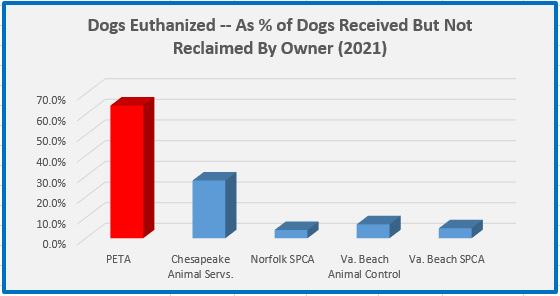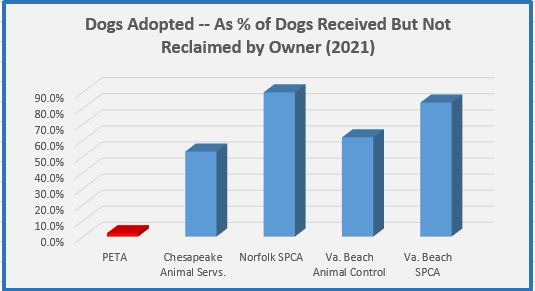In an interview posted on Youtube on June 6, 2022, Ingrid Newkirk, founder of the animal rights group People for the Ethical Treatment of Animals (PETA), discussed several subjects, including claims made in 2004 by comedy team Penn & Teller that PETA kills dogs and cats. Ms. Newkirk described the Penn & Teller claims as “cheap” and “misinformed.” (We have reported in the past (see, for example, here) on the statistics compiled by the Virginia Department of Agriculture and Consumer Services (VDACS) showing that PETA’s shelter in Norfolk, Virginia has a high rate of euthanasia when compared to other shelters operating in the Commonwealth of Virginia.) According to Ms. Newkirk, PETA’s shelter is an “open admission shelter” that takes in “animals that are on their last legs” — “the dregs, if you will” — that “have the door slammed shut on them in other places.” The implication is that this is the reason for the high euthanasia rate. Ms. Newkirk stated that PETA would “never” euthanize a healthy animal.
Ms. Newkirk’s interview came on the heels of an event recently sponsored by PETA called the “Poochella Festival” which PETA described as a “multishelter adoption event” designed to help “Virginia dogs find loving homes.” According to PETA, “[o]ur shelters” — presumably PETA and the four other local animal shelters that participated in the event — “are bursting at the seams with wonderful dogs who would love to become great companions.”
Given its history of euthanizing the vast majority of dogs that it receives, the assertion that PETA is “bursting at the seams” with dogs to be adopted struck us as questionable. So, we decided to look at the reported data to see how PETA compares with the four shelters that PETA stated participated in “Poochella:” Chesapeake Animal Services, the Norfolk SPCA, Virginia Beach Animal Control, and the Virginia Beach SPCA.
The following table combines the publicly available numbers reported by PETA and the four shelters on their respective 2021 VDACS summary of animal custody records regarding the disposition of dogs that the shelters received. This is information that each public and private animal shelter in Virginia must submit annually to VDACS:
Displayed graphically, the percentage of unclaimed dogs that PETA euthanizes is much higher than the percentages of unclaimed dogs euthanized by the other shelters:
By the same token, the percentage of unclaimed dogs that PETA actually adopts out is miniscule when compared to the adoption percentages of the other shelters:
That PETA claims to be an “open admission shelter” as Ms. Newkirk asserts, does not appear to justify these differences. The stated intake policies of the four other shelters at “Poochella,” as filed with VDACS, indicate that they have few, if any, limitations on intake. Chesapeake Animal Services (a public shelter) has no stated limitation on intake other than “[s]urrenders are only accepted from Chesapeake residents.” The NorfolK SPCA (a private shelter) states that “[a]nimals are accepted as owner surrenders as space allows and by appointment.” Virginia Beach Animal Control (a public shelter) describes itself as “an open-admission public shelter.” The Virginia Beach SPCA (a private shelter) states that “[w]e have an open door relinquishment policy.”
All of these shelters are within driving distance of each other. It is not plausible that only the hard cases end up at PETA. Given their lack of material restrictions on surrender, the four other shelters are just as likely as PETA to be presented with terminally ill or hopelessly injured animals, but they all have adoption rates significantly higher than PETA’s and euthanasia rates that are significantly lower.
In her interview, Ms. Newkirk compared PETA’s euthanasia services to so-called “no kill” shelters, asserting that the no kill facilities do not offer euthanasia services because it would “ruin their statistics.” Regardless of what may motivate a shelter to be no kill, this seems beside the point. As the data for the “Poochella” participants shows, there are four other public or private shelters in PETA’s neighborhood that perform euthanasia but at a significantly lower rate than PETA. Against this backdrop, PETA’s “Poochella” has all the earmarks of an effort by PETA obtain credibility by association.
If, as Ms. Newkirk asserts, it is “cheap” to point to PETA’s euthanasia rate, then PETA should be more transparent in explaining its numbers. If, as Ms. Newkirk asserts, PETA would “never” euthanize a healthy animal, then PETA should be quite willing to explain in each case — and publicly — the reason why PETA euthanized each of the dogs it put down.
PETA’s IRS Form 990 for the tax year ending July 31, 2020 indicates that PETA took in total revenue of $60,643,106. Perhaps PETA should use some of that money to figure out how to improve the adoption rate of its Norfolk “shelter.”



